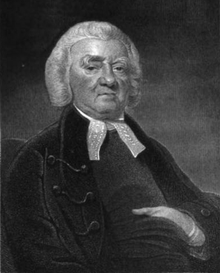Samuel Parr
| Samuel Parr | |
|---|---|
 |
|
| Born |
26 January 1747 Harrow on the Hill |
| Died | 6 March 1825 (aged 78) Hatton, Warwickshire |
| Nationality | British |
| Occupation | Schoolmaster |
| Known for | Schoolmaster, Writer |
Samuel Parr (26 January 1747 – 6 March 1825), was an English schoolmaster, writer, minister and Doctor of Law. He was known in his time for political writing, and (flatteringly) as "the Whig Johnson", though his reputation has lasted less well than Samuel Johnson's, and the resemblances were at a superficial level; Parr was no prose stylist, even if he was an influential literary figure.
Parr was born at Harrow on the Hill to Samuel Parr, a surgeon, and his wife Ann. Samuel was a determined and educated man who taught his only son Latin grammar at the age of four. At Easter 1752 Parr was sent to Harrow School as a free scholar, and when he left in the spring 1761, he began to assist his father in his medical practice. His father tried to direct Samuel towards a medical career. Stubbornly, Parr repeatedly turned down offers to extend his medical knowledge. In early November 1762, Parr's mother died. Less than a year later, his father married again, this time to Margaret Coxe, much to the displeasure of his son, who was sixteen at the time.
Samuel was eventually allowed to swap medicine for divinity. To this end, Parr entered the University of Cambridge, perhaps as a sizar as his stepmother had suggested or perhaps not. In 1765 he was admitted to Emmanuel College, Cambridge, where, as he wrote later, his "tutors were eminently able, and to me uniformly kind". On 23 January 1766, only a few months into his 14-month stay at Cambridge, Parr's father died at the age of 54. Even with financial support from Harrow, money now became a problem, and Parr, unable to continue his studies without going into debt, was forced to leave Cambridge. Because of Cambridge's rules regarding bachelorships in divinity, he could claim one after ten years practising and would not have to be a member of the university to do so.
Needing both funds and intellectual stimulus, he decided to return to Harrow. From February 1767 to the close of 1771 he served under Robert Sumner (by that time a personal friend) as head assistant at Harrow, where he had Richard Brinsley Sheridan among his pupils and enjoyed an income of about £100 p.a., consisting of £50 salary and about the same amount in fees from private pupils. When the headmaster died in September 1771, Parr immediately applied for the position, but was not selected. Harrow demanded every applicant had a Master of Arts degree; an honorary one was swiftly granted to him from Cambridge, where all of his previous teachers spoke highly of him.
...
Wikipedia
